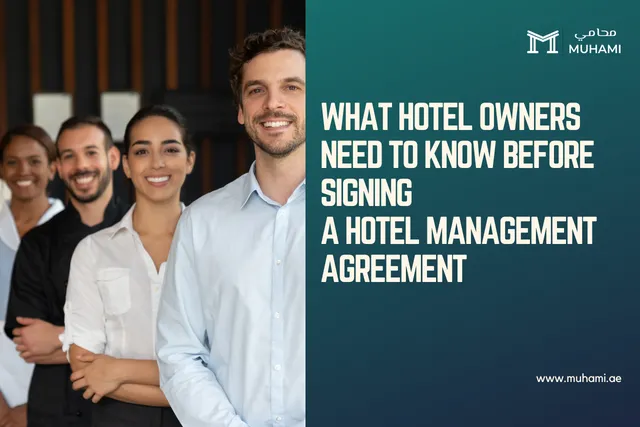Branded Residences in UAE: Where Luxury Living Meets Legal Complexity - Guide for Buyers

There’s something unmistakably magnetic about Dubai’s skyline, bold, unapologetic, and always aiming higher. But beyond the sweeping architecture and the sea of cranes, a new form of luxury has taken shape: branded residences and hotel-serviced apartments. They promise more than just a place to live — they sell a lifestyle, wrapped in the prestige of global names like Ritz-Carlton, St. Regis, Armani and many others.
From the outside, it all seems seamless: hotel-style living in your own home, complete with concierge service, private chefs, and infinity pools that seem to melt into the horizon. But peel back the glossy brochure, and a more nuanced picture emerges — one where real estate law, hospitality operations, and investor expectations collide.
A Simple Question, Not So Simple an Answer
Let’s say you just bought a branded apartment inside a five-star resort. You hold the title deed. You pay service fees. You use the pool. But here’s the question..
Are you a homeowner… or a guest?
Legally, this is where things get interesting. On paper, yes — you're a property owner under Dubai’s real estate laws. But the moment your apartment is connected to a hotel brand, you’re also stepping into a hospitality environment, where brand standards, operational rules, and service charges often take the wheel.
Dubai's Strata Law (Law No. 6 of 2019) covers joint property ownership and common area management. In theory, it gives owners collective power to make decisions. But in reality, when a global hotel brand is involved — especially in mixed-use developments — that power can feel more symbolic than real. The brand has a reputation to protect. The developer has a contract to honor. And you, as the buyer, might find your say diluted when it comes to anything that touches “the guest experience.”
The Off-Plan Dream vs. The Legal Reality
Many branded residences are sold off-plan — with renderings of rooftop lounges and curated experiences. These sales fall under the watch of RERA and the Dubai Land Department, with developers required to open Escrow Accounts (Law No. 8 of 2007), so your money goes where it’s supposed to: the project itself.
But here’s the issue: while you may review the Sales and Purchase Agreement (SPA) thoroughly, few buyers ever see the underlying Hotel Management Agreement — the contract that governs how the hotel brand will run the building, the facilities, and even your future interactions with your own property.
Questions like:
- Who controls the building’s lobby?
- Can you opt out of using the brand’s cleaning service?
- Will you be allowed to list your unit on Airbnb?
- Can you use your unit as a permanent residence, or only as a vacation home?
…are often answered somewhere deep in an agreement you weren’t given.
This isn’t necessarily bad faith — it’s just the nature of how these deals are structured. But it creates a mismatch between what buyers think they’re buying, and what they’re actually signing up for.
What This Means for Hotel Operators and Developers
From the operator’s side, branded residences are a dream. They expand the brand’s footprint without the cost of land or construction. They deepen loyalty. They generate long-term revenue from services and management fees.
For developers, they sell faster and at higher prices than traditional residences — often by as much as 20–30%. The math makes sense.
But then the dust settles, the handovers begin, and the legal headaches appear. Residents want more say. Some push back on service charges. Others question if the rental returns they were “promised” in flashy brochures ever really existed.
Suddenly, the operator is not just managing a hotel — they’re navigating a community of homeowners with rights, voices, and occasionally, lawyers.
What Can We Do Better?
The easy answer is to say the law needs to catch up. But UAE's legal landscape is constantly evolving, and it's done a commendable job so far. Rather than point out gaps, let’s talk about how we can refine the current system to keep pace with this fast-moving hybrid model.
For starters, imagine if:
- Buyers received a Plain English summary of the hotel management agreement before signing.
- There were clear disclosure rules about whether rental returns are guaranteed or simply projected.
- A new RERA framework existed specifically for branded residences, balancing the rights of operators and owners.
- Disputes over service fees or operational rules could be handled by a dedicated hospitality real estate tribunal, instead of dragging both sides into costly litigation.
None of these ideas require rewriting the legal code from scratch. They simply need focus — and a little empathy for all sides of the table.
The Final Word: Know What You’re Really Buying
Branded residences are here to stay. They reflect what UAE does best: luxury, innovation, and lifestyle integration. And for many buyers, they offer a beautiful way to live or invest.
But as we embrace this model, both investors and developers should approach it not just with excitement — but with clarity.
Ask questions. Read the fine print. Know your rights. And understand that in a branded residence, you're not just buying square footage — you're buying into an experience, a structure, and a legal ecosystem.
When real estate meets hospitality, the potential is massive. But so is the responsibility — on all sides — to keep things fair, transparent, and future-proof.
Any Questions?
Connect with lawyers and seek expert legal advice
Share
Find by Article Category
Browse articles by categories
Related Articles

Free Zone Companies Can Now Own Real Es…
A Legal Change That Feels Like a Business Invitation Sometimes, a law change…

Free Zone Companies Can Now Own Real Estate in Du…
A Legal Change That Feels Like a Business Invitat…

The Legal Reality Behind Short-Term Ren…
Written by Mohamed Darwish, a hospitality and real estate lawyer, Darwish Legal…

The Legal Reality Behind Short-Term Rentals in Du…
Written by Mohamed Darwish, a hospitality and rea…

What Hotel Owners Need to Know Before S…
By Mohamed Darwish | Founder of Darwish Legal Consultants - Specialist in Hospi…

What Hotel Owners Need to Know Before Signing a H…
By Mohamed Darwish | Founder of Darwish Legal Con…
